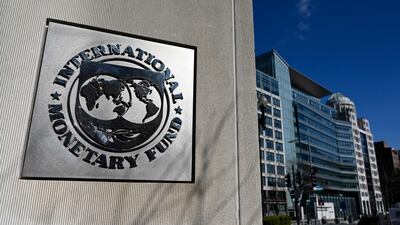Live updates: follow the latest news on Russia-Ukraine
Ukraine faces a deep recession and a large funding gap amid a drop in tax revenue this year as Russia’s military offensive in the country continues to worsen, the International Monetary Fund has said.
The conflict is expected to force a 10 per cent contraction in Ukraine’s real gross domestic product this year, the Washington-based lender said on Tuesday.
Given the fluidity of developments, the country’s near-term real growth projection should be considered “preliminary and subject to unusually large uncertainty”, with serious economic consequences going forward.
The European country’s real gross domestic product grew 3.2 per cent in 2021 as a record grain harvest and strong consumer spending helped to lift growth in the last quarter of the year.
Before the conflict, the country had gross foreign exchange reserves of $30.9 billion and its revenue remained strong in the first two months of this year.
However, its tax collection capabilities are now severely hampered and its economic output faces a massive decline.
Data on wartime real GDP contractions in Iraq, Lebanon, Syria and Yemen suggests that Ukraine’s annual output contraction could eventually be in the range of 25 per cent to 35 per cent.
The fund estimates that Ukraine’s gross external financing needs could grow to $4.8bn this year in its baseline scenario where the conflict is resolved quickly.
“Financing needs are large, urgent and could rise significantly as the war continues,” the fund said.
The current financing gap estimates should be considered to be a “bare minimum and a bridge towards the point in time when a comprehensive post-war damage assessment will allow for an adequate estimate of total financing needs, which would likely be significantly higher”.
The fund expects the Ukrainian financing gap to be covered by multilateral lenders, the EU and G7 economies.
On Monday, the IMF executive board also approved the disbursement of $1.4bn under the Rapid Financing Instrument to help Ukraine meet urgent financing needs.
The disbursement, equal to 50 per cent of Ukraine’s quota in the fund, will help the country to meet its balance of payment needs, the fund said on Tuesday.
The World Bank also approved $200 million in additional financing to bolster Ukraine’s social services for vulnerable people. The funding is on top of the $723m mobilised for the country, of which $350m has already been disbursed.
This financing is part of the previously announced $3bn package of support for Ukraine, which will be disbursed over the coming months, the World Bank said on Monday.
However, despite support from multilateral financial institutions and western allies, refugee flows of more than 2.7 million and the destruction of Ukraine’s key infrastructure only serve to highlight the country’s uphill struggle to stave off an economic catastrophe.
The fund expects Ukraine’s revenue to shrink as the conflict weighs on individual and business incomes, and inflates expenditure.
The primary deficit is expected to widen by 2 percentage points of GDP to 3.1 per cent in the fund’s baseline scenario, where revenue will rebound quickly once the conflict is over.
“These assumptions depend on the duration and depth of the conflict, which is highly uncertain,” the IMF said.
“The authorities [in Ukraine] are rightly focusing on ensuring the continuity of critical government operations, preserving financial stability and protecting priority spending,” the fund said.
So far, the emergency policy response has been “remarkable”, although administrative and capital controls have been introduced to preserve foreign exchange reserves and reduce exchange rate uncertainty.
The National Bank of Ukraine has established a new liquidity facility and introduced regulatory forbearance measures. There are cash withdrawal limits but cashless transactions have not been barred.
As fiscal policy focuses on ensuring priority payments, Ukraine “has stayed current on all debt obligations”, the fund said.
managing director, IMF
Russia’s economy has also taken a massive hit after the US and its allies took punitive action against Moscow for its military offensive.
Earlier this month, the Institute of International Finance projected that Russia's economy will shrink 15 per cent this year as it slides into a recession twice as severe as the 2009 contraction.
Earlier this month, Moody’s downgraded 95 Russian companies after cutting the country’s sovereign rating deeper into non-investment grade territory.
The IMF has also raised concerns over Russia’s ability to service its debt, joining a growing number of rating agencies and investors who expect an imminent debt default by Moscow.
As oligarchs in President Vladimir Putin's inner circle face sanctions, many western companies have exited or temporarily suspended operations in Russia.
The US and UK have banned the import of Russian crude while Europe has pledged to reduce its reliance on Moscow for its energy needs.



















































